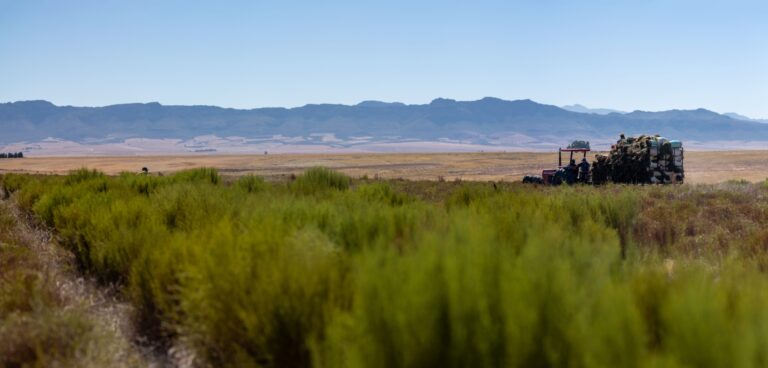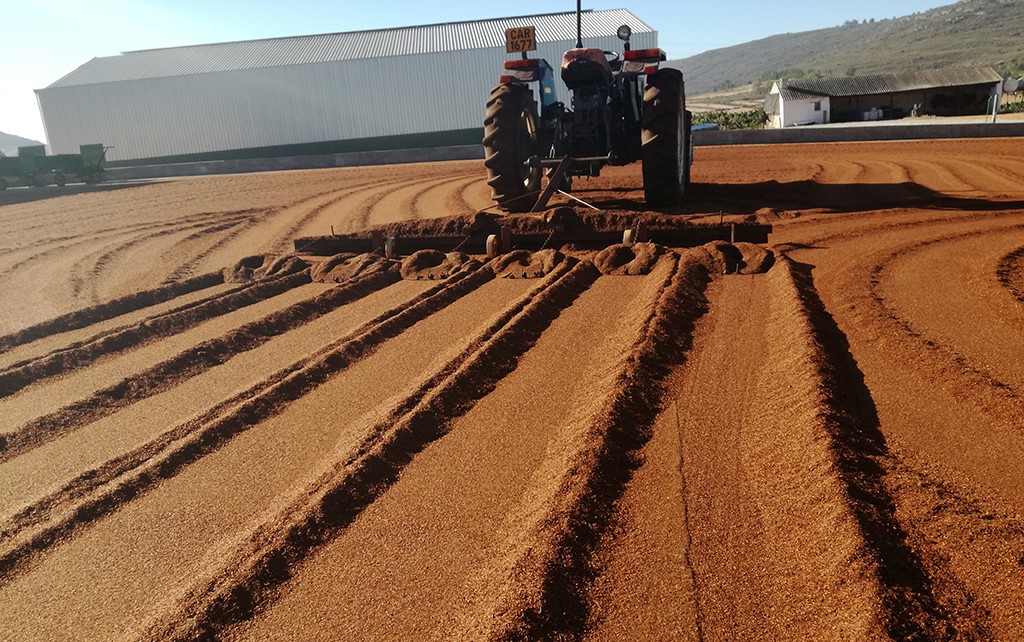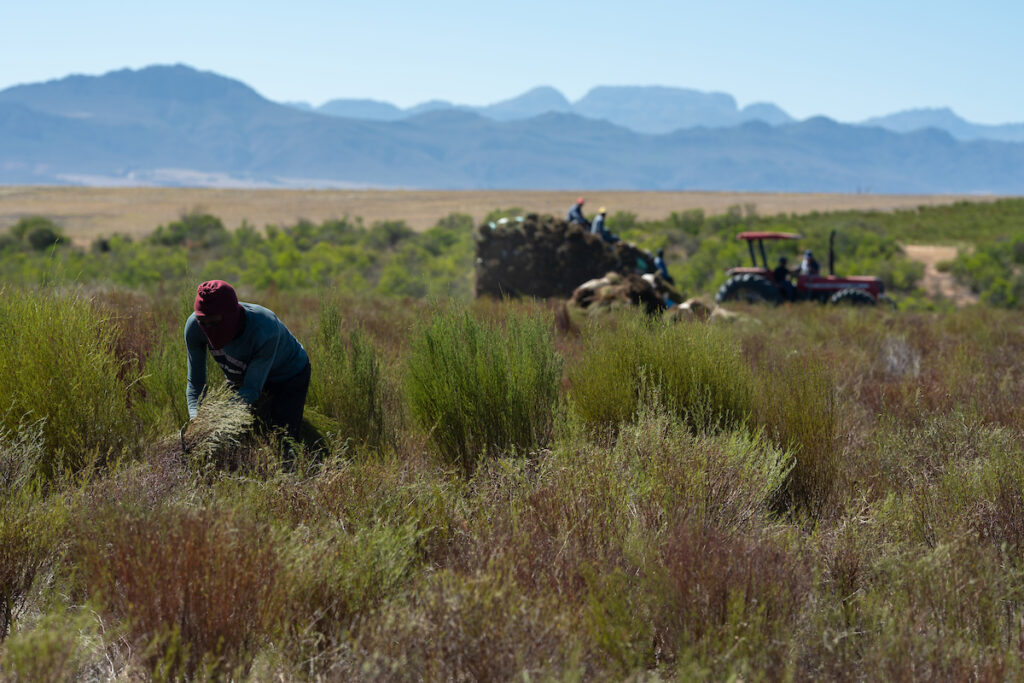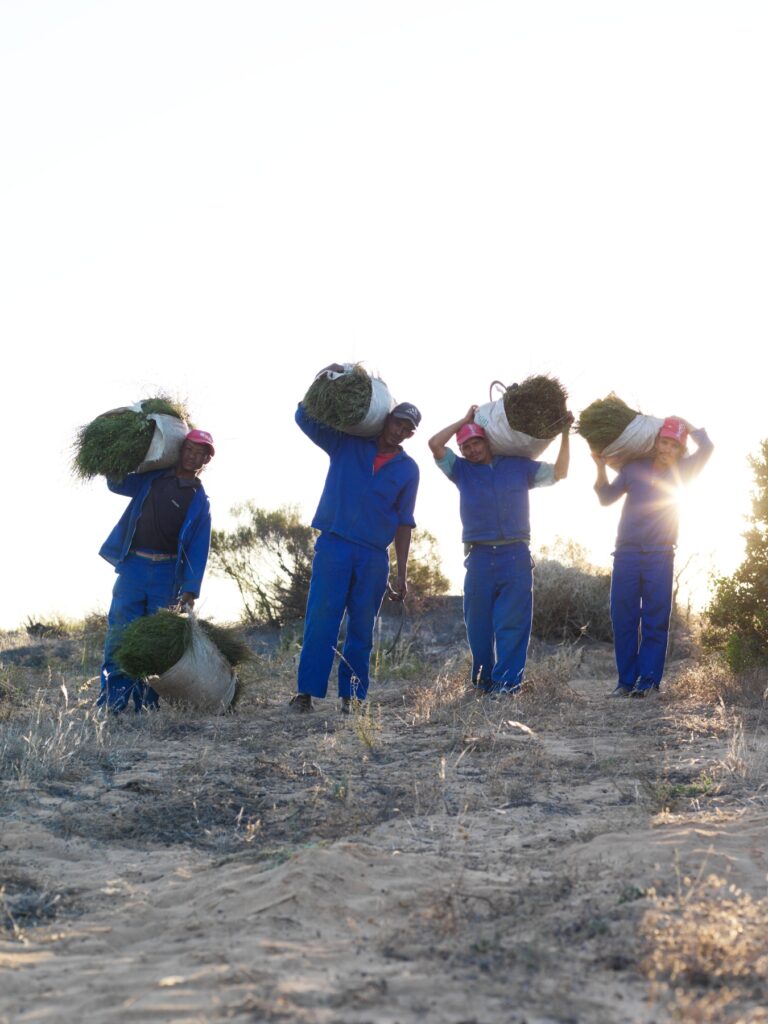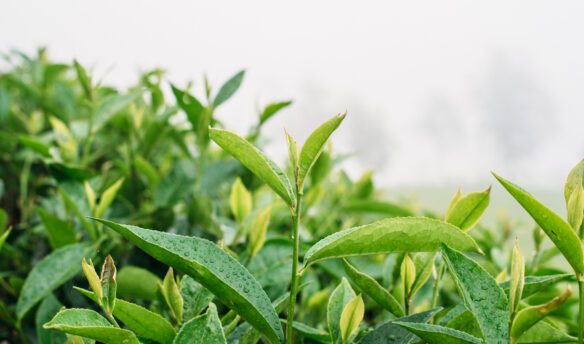In July 2022, members of South Africa’s commercial rooibos tea industry paid ZAR12.2 million (700,000 USD) to South Africa’s Indigenous Khoi and San communities. The payment makes good on a historic agreement, called the Honeybush Rooibos and Honeybush Traditional Knowledge Benefit Sharing Agreement, signed in 2019 that recognizes South Africa’s first peoples as the original knowledge holders of the region’s world-famous rooibos tea.
Rooibos is an herb plant native to South Africa and can be made into a caffeine-free reddish-brown tea when harvested and dried. Used for medicinal reasons for centuries, rooibos can be found in many coffee shops and on tea menus across the globe, and its popularity fuels the rooibos tea industry within South Africa.
The South African government argues that the agreement, referred to as the Benefit Sharing Agreement, will distribute the profits of commercial rooibos tea production to Indigenous groups yearly as an attempt to right a historical wrong. Barbara Creecy, the Minister of Environment, Forestry, and Fisheries, says the deal “sets the benchmark for future similar agreements.” Observers and industry players believe this is a pivotal moment that could inform and influence how formerly colonized people are given back the resources taken from them.
Redistributing Wealth
Archaeological evidence shows that southern Africa’s Khoi and San Indigenous people utilized nearly 100 medicinal plants to maintain their diet, including rooibos. When colonists arrived, they took their land, leading to generational harm.
The Benefit Sharing Agreement marks a historic moment for Indigenous communities for several reasons. “What various people in this tea industry have told me is that this agreement is the first such in the world which encompasses a whole industry,” says Martin Bergh, chairperson of the South Africa Rooibos Council (RC). He notes that 1.5% of all revenue from commercial rooibos production will be paid annually to the Khoi and San communities.
The RC facilitated the agreement on behalf of the rooibos processors, researchers, marketers, and exporters, while the South African minister of agriculture, forestry, and fisheries, coordinated between both sides (the Khoi and San communities and the council) to reach an agreement after extensive negotiations begun in 2014.
This deal is an essential lesson for any foreign or domestic company wishing to invest in South Africa’s burgeoning tea sector. “There’s social tax to be paid to ensure fairness,” says Shamiso Mupara, a forestry and climate justice activist working across southern Africa. “As a signatory to the UN Nagoya Protocol, South Africa requires all who trade in indigenous biological resources, such as rooibos tea, to share benefits with traditional knowledge holders fairly and equitably. You can’t simply invest in the biological tea sector and ignore this aspect.”
Mupara notes that rooibos production is still hugely profitable, even with commercial tea producers making payments to Indigenous groups. “There’s no need to sulk. There’s still a healthy profit to be made from the global Rooibos tea trade even after putting aside the 1.5% levy,” she says.
Indeed, rooibos is a big money production in South Africa. Bergh says the South African rooibos industry is worth ZAR420 mn ($24mn). He arrived at this figure by calculating data from processors who buy rooibos in bulk from farmers.
Transparency And Fairness in Tea
In the Benefit Sharing Agreement, South Africa’s minister of forestry will act as the escrow agent of the money, keeping things transparent on both sides. “The 1.5% sum is collected from the tea processors and paid into a trust run by the minister on everyone’s behalf. [The minister] then pays that money to two trusts held by the Khoi and the San people,” explains Bergh.
This may seem like a small detail, but it’s essential. When commercial resource extraction corporations are responsible for paying money directly to communities on whose land they farm or mine, corruption can occur. For example, companies that bought palm oil fruit from indigenous tribes in Indonesia were accused of vastly underpaying communities by millions and not fulfilling promises to return or share land. At the same time, such firms were selling palm oil fruit for significant profit to global consumer corporations like Johnson & Johnson, Kellogg’s, and Mondelēz.
“When the South Africa government acts as an ‘enforcer’ of the deal,” says Dennis Juru, president of the South Africa International Cross Border Association, a business lobby with members that transport bulk tea to South Africa’s ports for export, “rooibos tea corporations can be held more accountable.”
Who Owns Tea?
The Benefit Sharing Agreement is complex because the annual payment involves multiple recipients: the Khoi and San people. Indigenous nations are not a monolith, and communities don’t necessarily share similar interests. South Africa’s Indigenous nations were decimated and degraded over centuries of colonialism of racist apartheid policies, so even within groups, authority over who speaks for a group can be unclear. This year, in South Africa, different Indigenous groups almost came to blows in negotiations with Amazon, accusing the other of illegitimacy.
“That’s (the tricky) part of the equation,” says Bergh. “The government recognized two groupings to negotiate on behalf of the Khoi and San people. Those groups had to go back to their people regularly to say, ‘This is where we are, this is the negotiation. On the Rooibos Council side, we had to go back to farmers and processors regularly.”
However complex this negotiation is, it’s a decisive step forward. Mupara mentions the 2014 UN Nagoya Protocol on Access, which is an international agreement that requires states and corporations to extract bio-organic products in a way that respects and commercially benefits Indigenous people on whose land the business activities occur—so we might see deals like the Benefit Sharing Agreement in other countries.
Over the last 100 years, minerals, fish, and ocean products have been commercially exploited across South Africa on sites bordering Indigenous territories without consent and consultation. This rooibos tea deal, however small it seems, is a promising tilt towards restoring balance and rectifying past harm.
Photos courtesy of the South African Rooibos Council.
Nyasha Bhobo is a freelancer journalist covering women, land, technology and other humanitarian affairs in South Africa and Zimbabwe. Her work appears in Canada’s Globe & Mail, Passblue, Reuters and others.



